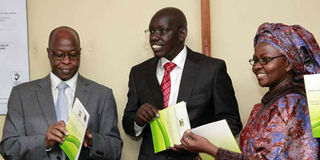News of research funding is welcome

Tirop Koskey (left), the chairman of the National Research Fund's (NRF's) board of trustees, Belio Kipsang (centre), the Principal Secretary of the State Department of Basic Education in the Ministry of Education, Science and Technology, and NRF Chairperson Millicent Omugaka in Nairobi on November 10, 2015. PHOTO | DIANA NGILA | NAIROBI
What you need to know:
Beyond teaching, the currency within academia in every well-performing economy is publications and grants.
This is a vicious cycle; good publications increase chances of winning grants, and funded grants enable good research and, subsequently, good publications.
In the absence of research funding, academics are left to teach with little engagement in research, consuming knowledge without creating it, articulating societal problems without solving them.
To fill this gap, Kenyan researchers, like many of their counterparts in most of Africa, have turned to the West, mainly working as collaborators and rarely as principal applicants, to compete for grants funded either by private foundations or from the research budgets of other governments.
Whereas the priorities set by these donor funds have sometimes mirrored the aspirations of Kenyans, this does not always hold true.
The Kenya National Research Fund recently called for proposals in perhaps one of the most reassuring indications that the country is on the right track in solving some of its most pressing problems. The world over, investment in research and innovation is regarded as a catalyst for growth and improvement of human opportunity.
I think this is likely to be a game charger in the academic and research circles. I received my first degree in 2005 and soon afterwards received a University of Nairobi merit scholarship to study for a master’s degree. My mentor at the university had received the same scholarship 15 years before me. Today, I mentor postgraduate students, some of whom are on the same scholarship.
In all these years, this scholarship has not changed. It provides the beneficiaries with a monthly stipend of Sh6,500 and Sh18,000 for their thesis research projects. This is barely 5 per cent of the minimum amount required to conduct a scientifically sound research project.
It is this chronic underfunding that has stifled growth of the research capacities of institutions and caused students to take six years to complete master’s degrees that should be completed in two years. With this kind of frustration, the universities and research institutions have found it difficult to attract and retain talent.
The funding indicated in the current competitive call from the National Research Fund are a reasonable start, with limits of up to Sh500,000 for a master’s project, Sh3 million for a PhD one, Sh20 million for a research project, and Sh100 million for infrastructure support to institutions. These figures are unlikely to allow high-end internationally competitive science, but certainly signal the beginning of an era where science by Kenyans is likely to have a fair play in competitive circles. The indicated goal of setting aside up to 2 per cent of Kenya’s GDP for the research fund should be reached fast and the impact of these investments measured.
WELL-PERFORMING ECONOMY
Beyond teaching, the currency within academia in every well-performing economy is publications and grants. This is a vicious cycle; good publications increase chances of winning grants, and funded grants enable good research and, subsequently, good publications. In the absence of research funding, academics are left to teach with little engagement in research, consuming knowledge without creating it, articulating societal problems without solving them.
To fill this gap, Kenyan researchers, like many of their counterparts in most of Africa, have turned to the West, mainly working as collaborators and rarely as principal applicants, to compete for grants funded either by private foundations or from the research budgets of other governments. Whereas the priorities set by these donor funds have sometimes mirrored the aspirations of Kenyans, this does not always hold true. Therefore, research funding is welcome news and a promise that Kenya is taking the initiative to drive her own research agenda.
The grants should be awarded competitively. It will be a good thing to see scholarly minds battle for the funds using their proposed innovations and solutions that aim to accelerate the growth of the economy and increase opportunities for the people. I have had opportunities to compete and win international grants and feel particularly excited that such opportunities now exist nationally and are prioritised by our own government.
Thumbi Mwangi is an assistant professor at the Paul G. Allen School for Global Animal Health at Washington State University in the US.




